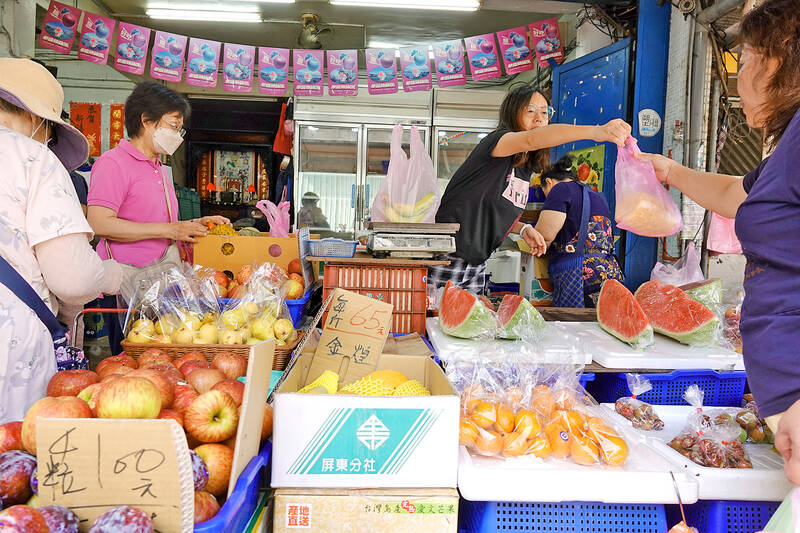The consumer price index (CPI) last month eased to 1.95 percent, below the central bank’s 2 percent target, as food and entertainment cost increases decelerated, helped by stable egg prices, the Directorate-General of Budget, Accounting and Statistics (DGBAS) said yesterday.
The slowdown bucked predictions by policymakers and academics that inflationary pressures would build up following double-digit electricity rate hikes on April 1.
“The latest CPI data came after the cost of eating out and rent grew moderately amid mixed international raw material prices,” DGBAS official Tsao Chih-hung (曹志弘) told a news conference in Taipei.

Photo: CNA
The central bank in March raised interest rates by 0.125 percentage points in what board members called a pre-emptive and appropriate attempt to curb inflation expectations that could run wild following the across-the-board electricity rate adjustments.
That did not happen, despite shelter costs rising 2.07 percent on the back of a 4.48 percent increase in electricity rates and a 2.34 percent gain in rents, the agency’s monthly survey found.
The electricity rate hikes did not prompt businesses to follow suit. Rather, a “revenge consumption” trend has mitigated, nearly two years after the lifting of COVID-19 restrictions.
Electricity rates would rise again in the summer from June to September, Tsao said.
Education and entertainment prices rose 1.58 percent, the smallest increase among major consumption categories, although demand for cross-border travel remained robust, he said, adding that after-school tutor fees rose 3.64 percent.
Food costs, the largest category by weighting, climbed 2.58 percent, as fruit and vegetable prices, and the cost of dining out rose 4.28 percent, 2.19 percent and 2.93 percent respectively, he said.
However, prices for 17 frequently purchased items declined for the first time in four years, while an unfavorable comparison base effect linked to soaring egg prices last year faded, he said.
Healthcare costs and medical product prices outpaced other consumption categories with a 3.52 percent rise after medical facilities raised registration fees, as well as drug and copayment charges, the survey showed.
Core CPI, a more reliable long-term price tracker because it excludes volatile items, posted a more benign 1.81 percent increase, the official said, affirming stable consumer prices.
The producer price index (PPI), which measures price movements from a seller’s perspective, accelerated 2.06 percent year-on-year, from a revised 0.49 percent gain in March, as international fuel and gasoline prices became more expensive and a weaker local currency made the price differences more apparent, DGBAS said, adding that cheaper poultry and base metal products helped soften the growth.
In the first four months, the CPI advanced 2.24 percent, while the PPI rose at a milder pace of 2.12 percent.

When an apartment comes up for rent in Germany’s big cities, hundreds of prospective tenants often queue down the street to view it, but the acute shortage of affordable housing is getting scant attention ahead of today’s snap general election. “Housing is one of the main problems for people, but nobody talks about it, nobody takes it seriously,” said Andreas Ibel, president of Build Europe, an association representing housing developers. Migration and the sluggish economy top the list of voters’ concerns, but analysts say housing policy fails to break through as returns on investment take time to register, making the

NOT TO WORRY: Some people are concerned funds might continue moving out of the country, but the central bank said financial account outflows are not unusual in Taiwan Taiwan’s outbound investments hit a new high last year due to investments made by contract chipmaker Taiwan Semiconductor Manufacturing Co (TSMC, 台積電) and other major manufacturers to boost global expansion, the central bank said on Thursday. The net increase in outbound investments last year reached a record US$21.05 billion, while the net increase in outbound investments by Taiwanese residents reached a record US$31.98 billion, central bank data showed. Chen Fei-wen (陳斐紋), deputy director of the central bank’s Department of Economic Research, said the increase was largely due to TSMC’s efforts to expand production in the US and Japan. Investments by Vanguard International

WARNING SHOT: The US president has threatened to impose 25 percent tariffs on all imported vehicles, and similar or higher duties on pharmaceuticals and semiconductors US President Donald Trump on Wednesday suggested that a trade deal with China was “possible” — a key target in the US leader’s tariffs policy. The US in 2020 had already agreed to “a great trade deal with China” and a new deal was “possible,” Trump said. Trump said he expected Chinese President Xi Jinping (習近平) to visit the US, without giving a timeline for his trip. Trump also said that he was talking to China about TikTok, as the US seeks to broker a sale of the popular app owned by Chinese firm ByteDance Ltd (字節跳動). Trump last week said that he had

STRUGGLING TO SURVIVE: The group is proposing a consortium of investors, with Tesla as the largest backer, and possibly a minority investment by Hon Hai Precision Nissan Motor Co shares jumped after the Financial Times reported that a high-level Japanese group has drawn up plans to seek investment from Elon Musk’s Tesla Inc to aid the struggling automaker. The group believes the electric vehicle (EV) maker is interested in acquiring Nissan’s plants in the US, the newspaper reported, citing people it did not identify. The proposal envisions a consortium of investors, with Tesla as the largest backer, but also includes the possibility of a minority investment by Hon Hai Precision Industry Co (鴻海精密) to prevent a full takeover by the Apple supplier, the report said. The group is